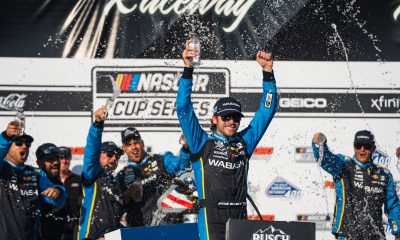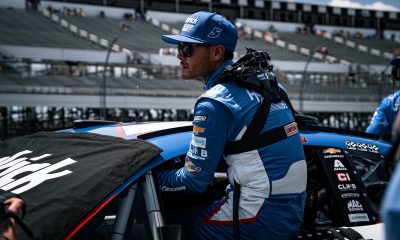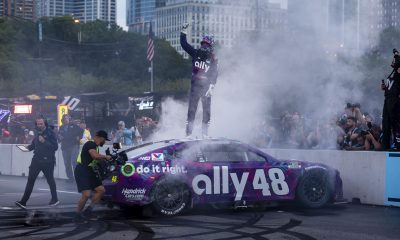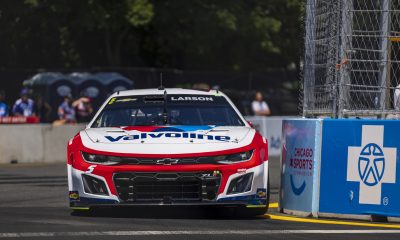
Gordon embraces his new role as an analyst for Fox NASCAR’s coverage.
Simply put, Jeff Gordon is a NASCAR icon whose contributions to the sport brought the sport to mainstream pop culture.
Arguably, the Vallejo, CA native catalyzed the young racers’ movement in NASCAR premier series racing. In the same time, he won races against legends like Dale Earnhardt, Rusty Wallace, and Dale Jarrett.
For this reason, Gordon and his No. 24 team were innovators in racing with an emphasis on teamwork. Car owner Rick Hendrick and crew chief Ray Evernham revolutionized the teamwork dynamics that are standard in today’s NASCAR.
Presently, Gordon lends his insights as one of the lead analysts for FOX NASCAR’s coverage. All things considered, his competitive fire remains alive in the TV booth similarly as those glory years in the No. 24 car.
Ultimately, the four-time Cup champion expressed content and satisfaction with his place in the sport. Furthermore, he quickly credits his strong support system for motivating him throughout his career.
Last weekend at Michigan International Speedway, Gordon spent time to talk about his career and current role with Fox. In the first of our two part series celebrating the 1997 season, let’s focus on the “Then and Now with Jeff Gordon!”
Rob Tiongson : Jeff, it’s your second full season in your role as an analyst for Fox NASCAR. You’ve been able make the transition from the driver’s seat to the booth. What has it been like for you to make that leap from the driver’s seat to the booth? Do you sometimes miss being in that racecar?

Gordon and his FOX NASCAR teammates Mike Joy and Darrell Waltrip are all smiles.
Jeff Gordon : I think when you’ve been a competitor as long as I was, of course, there’s that adrenaline rush that comes from being in the racecar in the heat of the battle especially in those closing laps when you’re battling for the win.
What I like about transitioning over to TV is that live broadcast side of it where you get to still feel that adrenaline by being a part of the broadcast, calling the race live, seeing the action on the track, and trying to relate it to what you’re saying and how you’re feeling it by almost trying to connect with what those drivers are going through.
I really don’t feel I’ve been missing out on much because I’m enjoying what I’m doing a lot now. Year two, I’m more comfortable with the process and (I have) better expectations. Just like as a racecar driver, you’re always trying to finetune.
RT : It’s shown in the telecasts as you’ve been more relaxed and provide more of your insights. One of the neater things is that you got to drive the No. 88 car last year. You understand a lot more of what the drivers are going through with the digital dash. I’ve noticed it’s something that some drivers have struggled with.

“I think that’s why you’ve got to spend a lot of time in the garage area…” – Jeff Gordon (Photo Credit: Jeremy Thompson)
JG : It’s really nice to be current. That’s a challenge. Every year, things change with technology and teams find ways to make the cars go faster. Like you said, the digital dash, I tested it one time as the driver of the No. 24 car but never raced it until I drove the 88 last year. So that was good information and experience to get for the booth.
Also, I got a chance to drive the cars with less downforce versus when I was last in the 24 car in ’15. That also was great experience that I can take up to the booth. How you stay current with that as time and years go by, I think that’s why you’ve got to spend a lot of time in the garage area and have as many contacts with the teams.
RT : For sure because they know what’s going on. It’s easy to say, “Oh yea, that’s what’s going on up here,” without being in that garage.
JG : Yea, you can lose touch with it real quick if you don’t do your homework.
RT : Exactly. You mentioned how you didn’t quite miss being in that car but you still have that competitive fire. Recently, you competed in this year’s Rolex 24 which was a success. Do you think, “Now that I won, I’m thinking about LeMans or other sporting car events?”

Gordon earned his first Rolex 24 at Daytona win with teammates Jordan and Ricky Taylor and Max Angelelli.
JG : It tells me that if the right opportunity comes along, I would consider it. One of the things that I’ve been thinking about for many years prior to stepping out of driving full-time was that I did the Rolex 24 in 2007. When I did it that year, I told myself, “OK, in order to do it again, I need to be fully committed to it. I need to be at every test, spend time with the team, practicing driver changes, simulator, (and) all of those things.
I wasn’t able to do that while driving the Cup car. As soon as I decided to step outside the Cup car, Wayne Taylor contacted me. He said, “Hey, are you ready to do this again?” I did it and I was fully committed to it. I’m glad it went the way it did. It was fun and we won and it was amazing. That’s the only way I would do something like that again is if I could spend that much time and that’s very difficult to do at LeMans.
RT : Everyone keeps saying, “Oh, you should do it!” They don’t understand that there’s a lot of preparation. It’s not just, “If you know the car, you can do it.” Like you said, it takes dedication.
JG : (chuckles) Well first of all, with the schedule, being in the booth with FOX doesn’t allow that. Second is that LeMans is not a permanent course. They don’t really have test sessions that you can run there until the week of the race. You can get in a driving simulator and that helps but that’s why I think experience at that track is really important.
When you’re talking about driving a prototype, which is what I would like to drive, and I guess I would be considered a GT car two, if that opportunity would come along, but I really want to drive a prototype because it’s so much fun. You don’t want to go there and mess around. That’s a track that you have to take seriously and your teammates expect you to be well verse and ready to go.
RT : Absolutely! Believe it or not, it’s the 20th anniversary of your second Cup championship. It was the first season in which you won at least 10 races and the title. You won the triple crown and your first road course race (Watkins Glen). How validating was that that title when considering the close call with teammate Terry Labonte in ’96?

Gordon expressed his excitement of winning the ’97 Cup title by leaping off his 24 car at Atlanta.
JG : What was validating about it was becoming a multiple champion. It was great to win in ’95. To me, winning that championship was the greatest validation, especially going up against Dale Earnhardt at that time.
We came up short in ’96 and I thought we had the car capable of doing it. We had some failures and made some mistakes as a team that prevented us from winning the championship in ’96 to our teammate Terry Labonte.
The validation was that we were very motivated and driven from coming up close and not getting it done in ’96. In ’97, it just showed the continued dominance by the 24 team and the wins and the championship and becoming a multiple series champion was a huge thing to accomplish.
RT : Earlier this year, FOX aired the “Refuse to Lose” documentary. It was a behind-the-scenes look into the preparation and ultimate triumph in the 1997 Daytona 500. Was it something that Ray Evernham looked into doing as a motivational tool for the team following the ’96 season?

Like Tom Brady and Bill Belichick, Jeff Gordon and Ray Evernham were a formidable duo.
JG : You’ll have to ask Ray. He’s really the one (to ask). A lot of the times, the crew chiefs are the ones that want to keep cameras from following along because they don’t want to give away any secrets or if they’re doing something that they think is contributing to their success, maybe it’s just how they prep for a race. They don’t want to give those trade secrets up.
Ray came up with an idea where (he thought), “I’ll hire the cameras and I’ll own the footage so I can control it.” It’s a genius move. I think the most genius part about it was that the footage was held on for 20 years.
That’s the part you’ll have to ask Ray. “What was his original plan with that video?” Because he’s really the one who came up with it.
RT : I have to imagine back then, as a young driver, you’re thinking, “Why are you guys doing this?”

“1-2-3, that is so awesome.” – Jeff Gordon following his ’97 Daytona 500 win.
JG : Yea, because you go and forth back with wanting to promote the sport and your sponsors. Also, you don’t want to let them have too much access. For whatever reason, Ray had this great idea to motivate the team. He was also fired up about what happened in ’96 that we didn’t win and he was determined to go in ’97 and not just win the championship but to go win Daytona.
RT : That was a big deal because you guys finished 1-2-3 which was unprecedented at the time. Teamwork showed in that penultimate restart, where y’all got on the radio saying, “Why don’t we pair up together and get past the 94 of Bill Elliott?”
JG : I think we knew that we had a car capable of winning. You can’t do it by yourself. Having your teammates to work with you made a huge difference.
RT : We all know that teamwork makes the dream work. What were some of the finer qualities that Ray brought out in you that motivated you during the 1997 season?

Gordon praised his inspirations in Ray Evernham, Rick Hendrick, and stepfather John Bickford for his racing success.
JG : The people that have been instrumental in my career are my stepfather (John Bickford), Ray, and Rick Hendrick. The thing that they all have in common that helped me was sometimes, they believed in me more than I believed in myself, whether they saw my confidence dropping or found a way to inspire me through things that they said or did.
That’s what Ray did. He knew how to push me right to the limit where I was almost angry. I was also not so far where I was able to still stay focused. It allowed me to get more out of myself, more out of the car, and more from the team. He did that very well, not just with me, but several others within the team.
You have to recognize everybody’s personality. That’s the genius thing about a crew chief like Ray Evernham or some of the best like Chad Knaus. They know how to push each person to get the most out of each one but you have to do it different. Not everyone is the same.
Author’s Notes : Special thanks to Jeff Gordon and Jon Edwards of Jeff Gordon, Inc. for their time and hospitality with this feature! You can “Follow” Jeff on Twitter, “Like” his Facebook page, and “Visit” his official website to learn more about this stock car icon. Look for our concluding part of our first “Then and Now” series in the coming weeks with Jeff’s longtime crew chief Ray Evernham!
Rob Tiongson is a sports writer and editor originally from the Boston area and resides in the Austin, Texas, area. Tiongson has covered motorsports series like NASCAR and INDYCAR since 2008 and NHRA since 2013. Most recently, Tiongson is covering professional basketball, mainly the WNBA, and women's college basketball. While writing and editing for The Podium Finish, Tiongson currently seeks for a long-term sportswriting and sports content creating career. Tiongson enjoys editing and writing articles and features, as well as photography. Moreover, he enjoys time with his family and friends, traveling, cooking, working out and being a fun uncle or "funcle" to his nephew, niece and cat. Tiongson is an alum of Southern New Hampshire University with a Bachelor of Arts in Communication and St. Bonaventure University's renowned Jandoli School of Communication with a Master of Arts in Digital Journalism.












